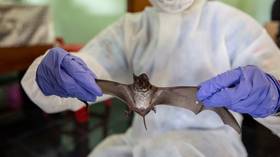India reports first case of deadly mpox strain

India has reported its first case of the mpox clade 1 strain, according to local media, citing official sources. The new variant is believed to be highly transmissible and has been linked to the mpox outbreak in Africa.
The virus, formerly known as monkeypox, was detected in a 38-year-old man from the southern state of Kerala who had recently returned from Dubai, it was reported on Monday. The patient’s sample was sent for testing after he developed a fever and rash “similar to chickenpox,” unnamed official sources told the ANI news agency.
Veena George, the health minister of the state, said “isolation facilities have been set up in all districts, and monitoring has been strengthened, including at airports” after the case was reported.
Last month, India reported its first mpox clade 2 case in Delhi. Prime Minister Narendra Modi stated at the time that the governs was “continuously monitoring” the situation. The Indian Health Ministry has instructed airports and land port authorities to remain vigilant for international passengers displaying mpox symptoms, the PTI news agency reported.
Clade I is associated with a mortality of up to 10%, while the clade 2 strain has a mortality of less than 1%, according to experts.
The World Health Organization (WHO) in August declared mpox a “public health emergency of international concern (PHEIC)” because of its upsurge in the Democratic Republic of the Congo (DRC) and a growing number of countries in Africa. Out of around 500 casualties, most have been reported in the DRC.
The virus spreads mainly through person-to-person contact. It is the second time the WHO has declared mpox, originating in Africa, as a public health emergency. During the global outbreak that began in 2022, the virus mostly spread through sexual contact. According to the WHO, the surge saw 100,000 confirmed cases and 234 deaths in more than 120 countries.
An earlier case in Indian capital New Delhi involved a 26-year-old male who tested positive for the West African Clade 2 strain, which was not covered under the WHO’s emergency alert. The patient was discharged on Saturday after receiving treatment at a government hospital.














